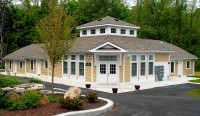Home Guru: A Herald of Angels Behind Housing ‘Freedom’ for the Disabled

By Bill Primavera
My friend Dave Goldberg, the plumbing and heating supplier in upper Westchester who retired from his own business, called me last week to tell me that he had joined the board of Freedom Gardens in Mohegan Lake and asked if I might visit.
He didn’t have to tell me what it was because I knew it as a small colony of homes for the disabled that I would drive by regularly during a period that I owned a “country” home in Putnam Valley, not far from my primary home in Yorktown Heights.
Just recently, on my town’s architectural review board, I participated in the review of its development of three new homes and a clubhouse.
I thought this would be a perfect opportunity to explore housing needs for the disabled, which, maybe surprisingly, is a consideration for as much as 20 percent of our population.
Within days, I was in the colony’s clubhouse in the company of Goldberg and some highly dedicated members of the board. Its delightful president, Frank Harris, 92, a World War II hero had escaped Nazi Germany to become an American citizen and serve in the war. He later built a career in the food service industry. Within minutes we found that we had good friends and experiences in common from my days as marketing director at The Culinary Institute of America.
Harris told me the story of Freedom Gardens, originally founded in 1958 in Yonkers by Lillian Petock Crowley, herself a paraplegic. Harris said that her objective was to fulfill a dream of establishing a “real home” for the handicapped. That is where the “Freedom” part of the name comes from, according to Harris.
“Lillian called it that, meaning that she wanted its residents to be ‘free’ from having to live in an institution,” he said.
By 1962, Crowley had accumulated the money she needed to purchase the property located in the hamlet of Mohegan Lake, requesting that her home be regarded as a “residence,” not a nursing home.
There was a raucous public hearing when the application was made, where neighbors complained bitterly for fear that the value of their homes would depreciate, some even shouting “we don’t want those cripples living here.”
Harris said there was an impassioned plea, where an early advocate for the home upbraided those neighbors for their small mindedness, dramatically espousing that the proposed residents may have had disabilities that were “physical and could be seen, but that their future neighbors had a disability that was mental and could not be seen.”
That speech shamed the community into a broader view of acceptance and, in 1958, the first homes were built.
Today, the complex on five acres is home to 15 mobility-impaired adults who are able to live independent and productive lives in reasonably priced Section 8 housing. In 2013, the new 3,300-square-foot, one-story building was constructed to accommodate three one-bedroom living facilities as well as an outdoor patio and garden.
Generally speaking, considerations that must be given to homes to accommodate the disabled include: the number of barriers from the outside to the inside, such as narrow walkways, uneven pavement, steps and hills; whether a ramp is required; whether the kitchen, bathroom and laundry room are easily accessible and do they require additional accommodations such as grab bars; whether sinks and counters are lowered; and if there are grab bars in the bathroom.
As our population ages, it will no doubt require a greater knowledge and sensitivity to the needs of the physically impaired. The availability of a complex like Freedom Gardens, for those who require public assistance to meet their needs, is a wonderful asset to any community.
The new building at Freedom Gardens is dedicated to the memory of Gary Kleiber, who served as the organization’s board of directors for many years and spearheaded the construction of the new facility. He suddenly passed away shortly after the $1.2 million facility was completed.
Any reader who would like to help care for the disabled may contribute to the fund set up in his honor by making a tax-deductible donation to The Gary Kleiber Fund, Freedom Gardens for the Handicapped, Inc., 1680 Strawberry Rd., Mohegan Lake, N.Y. 10547.
Bill Primavera is a Realtor® associated with William Raveis Real Estate and Founder of Primavera Public Relations, Inc., the longest running public relations agency in Westchester (www.PrimaveraPR.com), specializing in lifestyles, real estate and development. His real estate site is: www.PrimaveraRealEstate.com and his blog is: www.TheHomeGuru.com. To engage the services of The Home Guru and his team to market your home for sale, call 914-522-2076.

Examiner Media – Keeping you informed with professionally-reported local news, features, and sports coverage.
